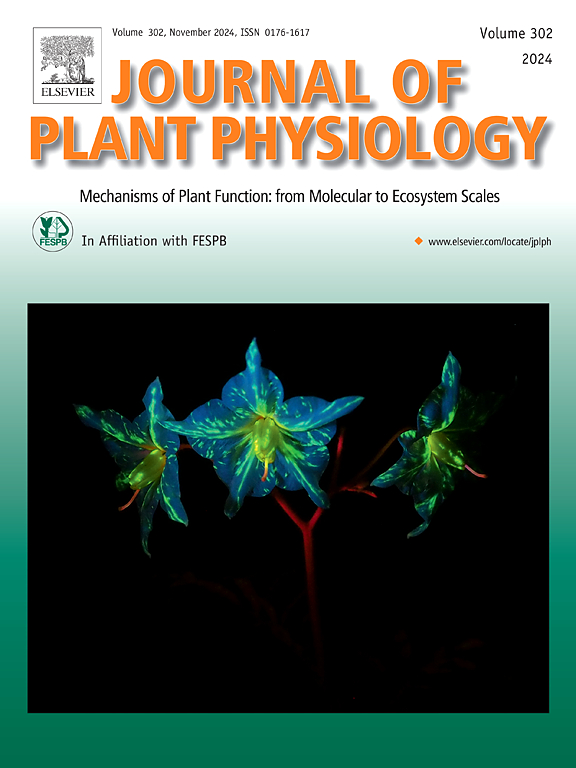鉴定 BpEXP 家族基因以及 BpEXPA1 基因在桦树茎发育过程中的功能特征
IF 4
3区 生物学
Q1 PLANT SCIENCES
引用次数: 0
摘要
膨胀蛋白(EXPs)是一种独特的植物细胞壁蛋白,具有诱导细胞壁膨胀的能力,并在木质部发育过程中发挥潜在作用。本研究共鉴定了25个BpEXP基因。生物信息学分析结果表明,BpEXP 基因家族在进化过程中高度保守。根据系统进化分析,所有这些基因被聚类为四组,即EXPA(Expansin A)、EXPB(Expansin B)、EXLA(Expansin-like A)和EXLB(Expansin-like B),其中BpEXPA1与PttEXP1和PttEXP2高度同源。RT-qPCR 结果表明,BpEXPA1 在茎中的表达量较高,且优先表达于第一节间,其次是顶芽和第三节间,用 GUS 分析法进行的启动子表达分析表明,它在发育中的木质部中表达,这表明 BpEXPA1 可能参与了桦树初级茎的发育。过量表达 BpEXPA1 可促进皮层细胞膨大,进而扩大皮层细胞的面积和层数,但会抑制次生细胞壁的沉积,导致转基因植株的细胞壁变薄,木质部纤维的管腔变大。这项研究将为研究 BpEXP 家族基因的调控机制提供信息,并为桦树遗传改良提供基因资源。本文章由计算机程序翻译,如有差异,请以英文原文为准。
Identification of BpEXP family genes and functional characterization of the BpEXPA1 gene in the stems development of Betula platyphylla
Expansins (EXPs) are unique plant cell wall proteins with the ability to induce cell wall expansion and play potential roles in xylem development. In the present study, a total of 25 BpEXP genes were identified in Betula platyphylla. Results of bioinformatics analysis described that BpEXP gene family was highly conserved in the process of evolution. All these genes were clustered into four groups, EXPA (Expansin A), EXPB (Expansin B), EXLA (Expansin-like A) and EXLB (Expansin-like B), according to phylogenetic analysis and BpEXPA1 was highly homologous to PttEXP1 and PttEXP2. The results of RT-qPCR showed that BpEXPA1 was expressed higher in stems and preferentially expressed in the first internodes, followed by apical buds and the third internodes, promoter expression analysis with GUS assay demonstrated that it was expressed in developing xylem, suggesting that BpEXPA1 might be involved in the development of the primary stems of birch. Overexpression of BpEXPA1 can promote cortex cell expansion and then enlarge the cortex cell area and layer, however inhibit the secondary cell wall deposition and result in the thinner cell wall and larger lumens of xylem fiber in transgenic plants. This study will provide information for investigating the regulation mechanism of BpEXP family genes and gene resources for birch genetics improvement.
求助全文
通过发布文献求助,成功后即可免费获取论文全文。
去求助
来源期刊

Journal of plant physiology
生物-植物科学
CiteScore
7.20
自引率
4.70%
发文量
196
审稿时长
32 days
期刊介绍:
The Journal of Plant Physiology is a broad-spectrum journal that welcomes high-quality submissions in all major areas of plant physiology, including plant biochemistry, functional biotechnology, computational and synthetic plant biology, growth and development, photosynthesis and respiration, transport and translocation, plant-microbe interactions, biotic and abiotic stress. Studies are welcome at all levels of integration ranging from molecules and cells to organisms and their environments and are expected to use state-of-the-art methodologies. Pure gene expression studies are not within the focus of our journal. To be considered for publication, papers must significantly contribute to the mechanistic understanding of physiological processes, and not be merely descriptive, or confirmatory of previous results. We encourage the submission of papers that explore the physiology of non-model as well as accepted model species and those that bridge basic and applied research. For instance, studies on agricultural plants that show new physiological mechanisms to improve agricultural efficiency are welcome. Studies performed under uncontrolled situations (e.g. field conditions) not providing mechanistic insight will not be considered for publication.
The Journal of Plant Physiology publishes several types of articles: Original Research Articles, Reviews, Perspectives Articles, and Short Communications. Reviews and Perspectives will be solicited by the Editors; unsolicited reviews are also welcome but only from authors with a strong track record in the field of the review. Original research papers comprise the majority of published contributions.
 求助内容:
求助内容: 应助结果提醒方式:
应助结果提醒方式:


